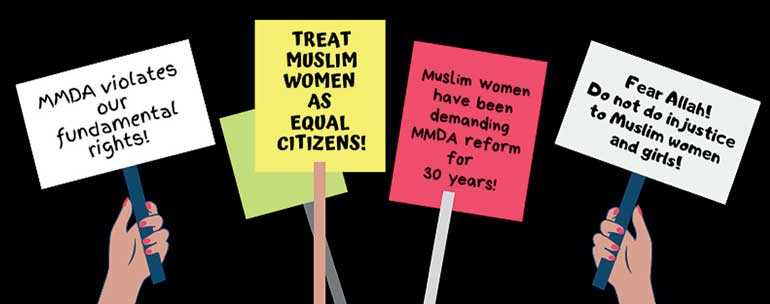Thursday Feb 12, 2026
Thursday Feb 12, 2026
Wednesday, 28 August 2019 00:00 - - {{hitsCtrl.values.hits}}

The Joint Cabinet Memorandum signed by Justice Minister Thalatha Atukorale and Postal Services and Muslim Religious Affairs Minister M. H. A. Haleem, is more a political exercise in trying to protect the Muslim vote bank than a serious measure to reform an injudicious act, which has victimised Muslim  women over half a century. Moreover, the Memorandum is only instructing the Legal Draftsman to draw up the necessary law to be presented to the Cabinet. Whether this will be accomplished during the term of this Government, which is already in disarray and pre-occupied with choosing a candidate for the Presidential Elections, is not at all certain. In all probability, the matter will be shelved for another round of discussion and compromise when a new Government comes to power. The battle for reform is not over yet.
women over half a century. Moreover, the Memorandum is only instructing the Legal Draftsman to draw up the necessary law to be presented to the Cabinet. Whether this will be accomplished during the term of this Government, which is already in disarray and pre-occupied with choosing a candidate for the Presidential Elections, is not at all certain. In all probability, the matter will be shelved for another round of discussion and compromise when a new Government comes to power. The battle for reform is not over yet.
Be that as it may, there are three issues in the Memorandum that declares a victory for the machinations of the conservatives led by ACJU, the so-called apex body of Muslim religious functionaries. One is regarding the minimum age of marriage, the second is in respect of women Qazis, and the third refers to custody and maintenance of children. On minimum age, the Memorandum has made an exception for those between 16 and 18, to be married “with the approval of the Qazi”. This is a provision that not only satisfies ACJU, but also provides an opportunity for dishonest Qazis to earn more money, by accepting bribes for their consent. Although there is a provision that states, “1-2 years imprisonment and Rs. 100,000”, as punishment for underage marriage without approval of a Qazi, it is not clear who will be punished, the parents of the couple, or the couple themselves. There is also no punishment for corrupt Qazis who would give approval for a monetary reward. With money, even birth certificates could be falsified for marriage purposes. Given the fact that underage marriage is quite common among Muslims, this provision, without specifying how it would be implemented, has virtually legalised it.
The total omission of women Qazis is the most blatant surrender of the Government and its Muslim parliamentarians at the feet of ACJU. This is one area on which the Muslim Personal Law Reform Action Group (MPLRAG) has been agitating for a long time, and its members have ample evidence to justify their concern, because of the male bias prevailing in the current men-only Qazi court system. Muslim women are appointed as Qazis in several other Sunni Muslim countries within the Shafi school of jurisprudence, such as Malaysia, Pakistan, and Indonesia, to name only those in Sri Lanka’s neighbourhood. It appears that ACJU has a mortal fear of Muslim women taking up leadership positions in public, in spite of the fact that there is nothing stated in the Quran preventing women from doing so. This fear of the conservatives is historic in this country. For example, when Ayesha Rauff unsuccessfully contested for a parliamentary seat in 1947, and when Ferial Ashraf successfully did it in 2001, there were malicious campaigns spread against them, particularly by the mullahs. A woman’s leadership, according to them, brings ruin to the family, community, and country. This was also one of the reasons why many conservative Muslims did not support the SLFP under Sirimavo’s leadership. When it comes to officiating as judges in particular, mullahs feel that women are too emotional and soft-hearted, and they would not be able to make hard decisions. This argument holds no water in this day and age, when women are excelling their male colleagues in the field of law and justice, let alone in other areas. Without provision for women Qazis, the Joint Memorandum is a sell out to a collective of misogynists.
Muslim Parliamentarians previously agreed to remove the issue of child custody and maintenance from Qazi court jurisdiction, and bring it under the District Court. In this Memorandum, that has been left out. These Parliamentarians, for political reasons, are clearly in bed with ACJU.
It is now ten years since Justice Saleem Marsoof and his committee started working on the MMDA reforms, before submitting the report in January 2018. Since then, there had been several setbacks to getting its recommendations legislated, because of behind the scene pressures from, and manipulations by, the ACJU and its bed fellows.
After another year and more, the Government has made a half-hearted attempt to implement some of Justice Marsoof’s recommendations, but without the most crucial ones. How can a woman Minister of Justice permit her own kind to suffer inferiority and injustice in matters of matrimony? Is it because they are Muslims? MPLRAG and its supporters have to continue battling for a better deal. Time is on their side.
(The writer is attached to the School of Business and Governance, Murdoch University, Western Australia.)